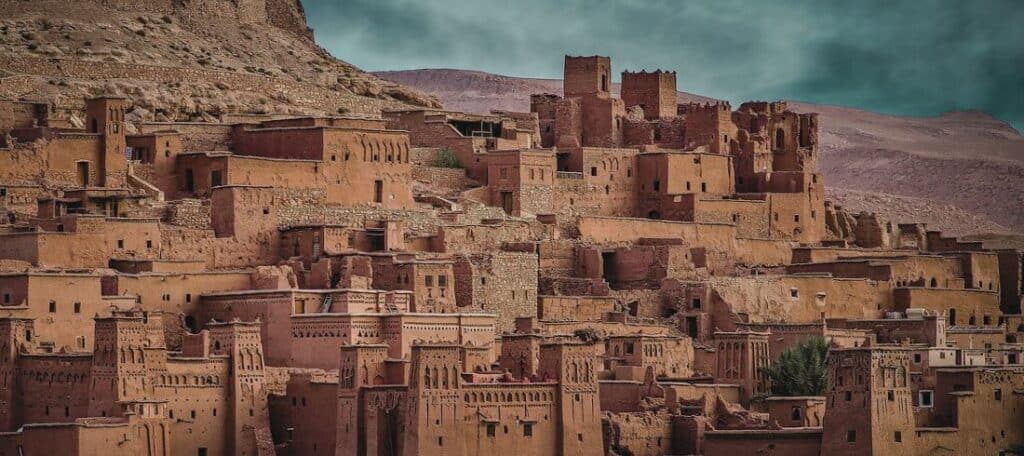
As the sun rises, it lights up Marrakech’s medina. It brings a mix of smells, sounds, and sights to life. Moroccan culture catches the hearts of travelers worldwide. With its growing population and unique government, Morocco marries the old with the new. Since gaining independence in 1956, this North African monarchy invites the world to explore.
Morocco is not just one thing; it is many. From Casablanca’s busy streets to the Atlas Mountains’ peace, it’s where Europe and Africa meet. Spain’s Ceuta and Melilla sit on its coast. This country’s variety, from desert to sea, is as rich as its culture. It’s bigger than California but united by its love for tourism in Morocco.
- Morocco offers travelers an experience rich in culture.
- With its unique governance system, Morocco mixes modernity with tradition.
- Being independent since 1956, Morocco stands out in North Africa.
- Casablanca is a hub of culture and economy.
- Morocco’s diverse geography includes both Atlantic and Mediterranean coastlines.
- Spanish enclaves on its coast reflect a deep historical connection.
- The growing tourism sector showcases Morocco’s many attractions.
The Diverse Landscapes of Morocco’s Terrain
Morocco is known for its diverse landscapes. These range from the rugged Atlas Mountains to the vast Sahara Desert. Not to forget the peaceful coastal escapes along its borders. This contrast in terrain draws both adventurers and those seeking peace to its varied landscapes.
The Atlas Mountains stretch majestically across Morocco. They are a natural barrier full of diverse ecosystems and traditional Amazigh communities. These mountains offer fresh valleys and snowy peaks, perfect for summer hikes and winter skiing.
On the other hand, the Sahara Desert‘s warmth contrasts with the mountains’ chill. Its vast sand dunes shine under the stars at night. It gives travelers a chance to experience one of the greatest wildernesses in the world.
Morocco’s coastal escapes also have a special allure. Agadir’s beaches are perfect for those who love the sun. Essaouira offers windy shores for windsurfing. Casablanca’s urban coast mix city life with beach relaxation.
| Region | Climate Type | Annual Rainfall | Average Rainy Days | Temperature Range in Marrakesh |
|---|---|---|---|---|
| Tangier, Tétouan, Al Hoceima | Mediterranean | — | — | — |
| Chefchaouen, Taza | Continental | — | — | — |
| Ifrane, Midelt | Alpine | — | — | — |
| Casablanca | Mediterranean | 398.3 mm | 72 | — |
| Fez | Continental | 470.4 mm | 109.8 | — |
| Marrakesh | Semi-arid | — | — | 18.6°C to 37.2°C |
Morocco’s varied geography and climates are unique. From Tangier’s Mediterranean air to Ifrane’s crisp alpine breeze, Morocco isn’t just a place to visit. It’s an array of experiences shaped by the land itself.
Moroccan Culture: A Melting Pot of Historical Influence
Morocco has a population of about 36,769,000 as of 2024. It’s a place where old meets new, especially in its capital, Rabat. Here, Moroccan architecture mixes with the energy of city life. To truly understand Morocco’s culture, explore its history. It was once a French protectorate and is uniquely located by both the Atlantic Ocean and the Mediterranean Sea.
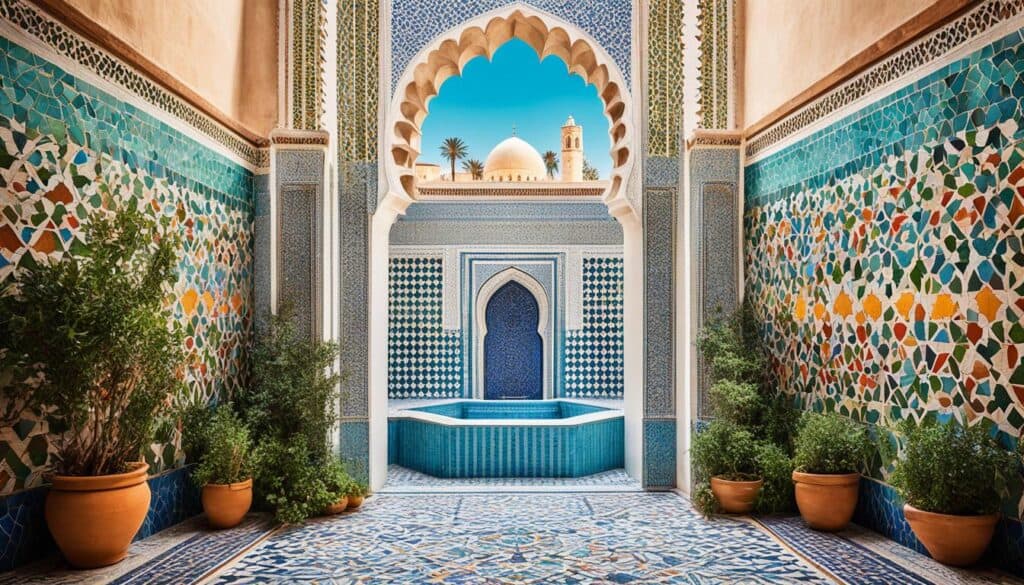
Architectural Marvels: Mosques, Riads, and Medinas
The heart of Moroccan architecture lies in its mosques, riads, and medinas. These can be seen from busy Casablanca to vast areas bigger than California. Casablanca is not just a large city and port. It’s also where history and modernity fuse creatively.
Musical Heritage: A Symphony of Traditional and Modern Tunes
Traditional music in Morocco blends many cultures. It combines Andalusian, Berber, Gnawa, and modern beats. These sounds fill both old medinas and new venues. This mixture shows the nation’s diverse influence from neighboring Algeria and Western Sahara.
Cultural Celebrations and Festivals
Morocco’s life shines in its cultural festivals. Events range from the Fes Festival of World Sacred Music to the Marrakech International Film Festival. These show a nation where food, music, and traditions from many cultures meet. Morocco, a friend to the U.S., joins in military and trade efforts. It aims to grow and help others, as seen after the 2023 earthquake.
What is Morocco known for?
Explore ancient medinas with their winding paths. Smell the spices in lively markets. Morocco is full of sensory wonders. It’s known for famous attractions in Morocco, a rich Moroccan culture, and a Moroccan cuisine that’s as varied as its history. The capital, Rabat, blends the new with age-old traditions. About 37.9 million people live in Morocco, covering 446,300 sq km.
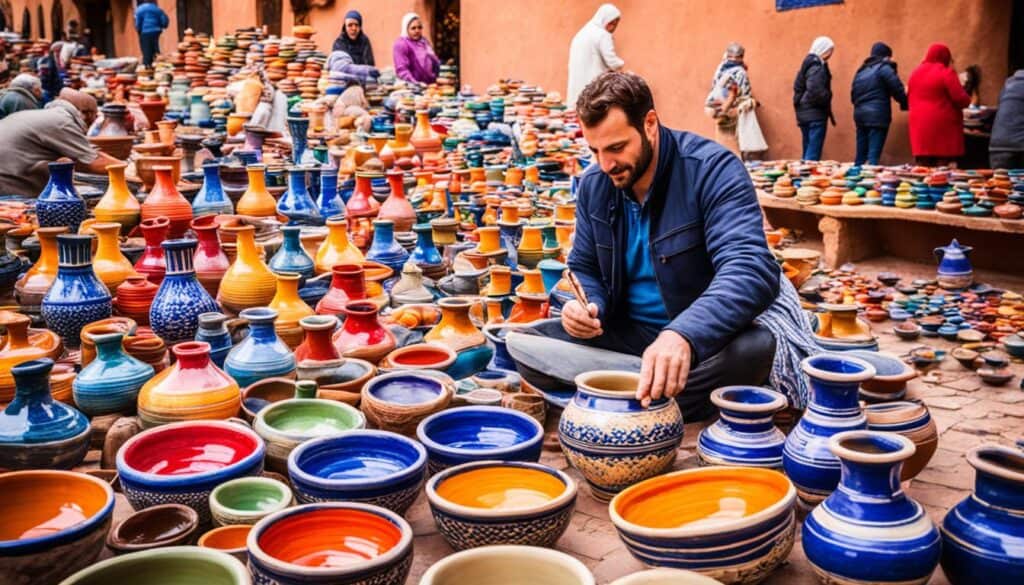
Men often live to 72, and women to 76. The leadership of King Mohammed VI and Prime Minister Aziz Akhannouch reflects the country’s history. Morocco’s story includes ancient Muslim dynasties and the rule of the Saadi and Alawi dynasties. These have shaped its global impact. For more on Morocco’s history, check out the BBC’s timeline.
Its buildings tell the story of its past. The Hassan II Mosque in Casablanca celebrates Islamic architecture. It highlights the importance of faith in Morocco. Ruins at Volubilis reveal ancient stories, while Marrakech’s markets show the role of trade and community. This richness defines Morocco—a place where history is alive.
To truly understand Morocco, you must experience its food. Moroccan dishes, like the flavorful tagine, are culinary art. Enjoying mint tea here is a cherished tradition. The cuisine weaves together history and creativity. It brings people together, sharing stories and continuing ancient traditions. Morocco invites the world to its table with open arms.
Rich Flavors of Moroccan Cuisine
Moroccan cuisine blends unique flavors from Andalusian Spain, Arabia, France, and Berber culture. This combination creates a dining experience like no other. Dishes like the famed tagine and popular couscous showcase a range of aromatic spices, including saffron, cumin, and ginger. These ingredients have helped Morocco earn a global reputation for gastronomic excellence.
Savor the Iconic Moroccan Tagine
The Moroccan tagine offers a taste of the country’s rich history. These dishes are slowly cooked in earthenware pots. They feature tender meats and vegetables with a mix of sweet and spicy flavors. Sharing a tagine meal reflects the warm hospitality of Morocco.
Aromatic Moroccan Mint Tea: A Symbol of Hospitality
Moroccan cuisine is renowned for its Moroccan mint tea, also known as ‘Moroccan whisky.’ This sweet beverage is made with gunpowder tea and fresh spearmint. It symbolizes Moroccan hospitality. The tea is served all day as a welcome to guests, showing the importance of kindness in Moroccan culture.
Exploring Moroccan Street Food and Markets
The street food in Morocco offers a variety of flavors and textures. You’ll find everything from tender Kefta tagine to crispy Makouda with spicy harissa sauce. The lively street markets are filled with the scents of Couscous and B’stilla. These dishes have gained recognition from UNESCO as part of the world’s Intangible Cultural Heritage.




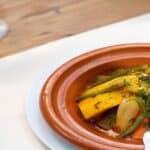
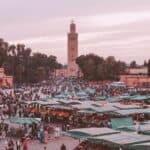
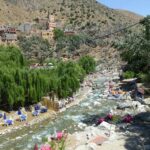
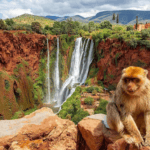
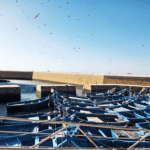
[…] makes the dish special. It mixes them with chickpeas and toasted pine nuts. This celebrates Morocco’s culinary heritage and […]
[…] range of train routes and services, making it a convenient hub for exploring different cities in Morocco. Direct rail links are available from Marrakech to popular destinations such as Casablanca, Fez, […]
[…] Atlas Mountains in Morocco provide an excellent opportunity for hiking and trekking enthusiasts. With its diverse landscapes […]